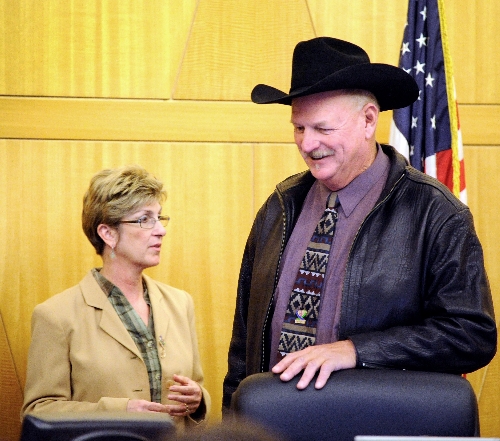Lobbying sparks Clark County Commission debate
A back-and-forth argument between two Clark County commissioners over a proposal to change the board's ethics policy snowballed into a discussion Tuesday about whether commissioners should have outside employment at all.
Commissioner Chris Giunchigliani, who requested the policy change, wanted to add in language that would prohibit commissioners from acting as paid consultants or lobbyists for people that deal with state and local government.
The request appeared to be a reaction to Commissioner Tom Collins' recent lobbying work in connection with a $600 million bus contract. Collins engaged in a monthlong consulting and lobbying relationship with Veolia Transportation, a company that bid on the seven-year fixed bus contract. The Regional Transportation Commission has since informally agreed to rebid the bus contract at the request of First Transit.
Collins has said he saw nothing wrong with working for Veolia, which approached him, he said.
At the meeting, Collins said he supported the policy change because it made things clearer. However, he suggested adding the words "any public sector employment" to prohibit someone from serving as a commissioner while on leave from their government job, as does Giunchigliani. Collins also brought up how the commission deals with zoning matters relating to the Clark County School District and how that might create a conflict.
Giunchigliani, a schoolteacher, bristled at the suggestion.
"During our conversation you questioned whether or not I could, as a public employee, as a schoolteacher, go back to my job," Giunchigliani said. "I said, 'Yes, I could.' This did not cover that. If that's what you're trying to get at, let's go ahead and put it out there."
She said the issue was more about who the commission can regulate.
"But if you want to prohibit me from going back to the classroom, that's fine," Giunchigliani said, before suggesting the commission also consider adding "private sector employment" to Collins' request, seemingly nullifying outside employment altogether.
"I don't want us to adopt something so restrictive or so unmanageable," she said. "The intent was you should not be compensated to lobby, while you're a commissioner, other elected officials."
The commission also discussed whether the policy would address spouses who work as paid consultants and could potentially end up in front of the board.
Commissioner Steve Sisolak continued to question whether the ethics policy "had any teeth" in terms of penalizing wrongdoers. Under the current policy, the board can reprimand or censure a commissioner and refer the violation to the district attorney's office.
Ultimately, no action was taken by the board.
Commissioner Larry Brown stepped in to suggest postponing further discussion until the board clarifies its intent with the policy change.
"I absolutely support this commission trying to create a policy that is transparent and encourages ethical behavior. ... I think there's an opportunity to take a look at a commissioner being a consultant," Brown said. "I have no problem with that. It's about what kind of consulting that commissioner will do."
Brown added he saw no issues with a commissioner consulting the private sector or government officials the commission has no control over.
"That is that individual's right to make a living," Brown said. "It's upon him or her to justify it not only before this board and the ethics committee, but ultimately the public."
Contact reporter Kristi Jourdan at kjourdan@reviewjournal.com or 702-455-4519.

















